Mystic Trends in Kashmiri Poetry
Kashmir,
which is known as the 'paradise on earth', has been the abode of eminent
scholars, savants, historians and poets, like Bilhan, Mamatachary,
Anandavardhana, Gunaverman, Abhinavagupta, Jonaraja, Kalhana, etc. These luminaries had
mastery over Sanskrit language. During the Muslim rule, Persian became
the court language. Kashmiri scholars did not lag behind in acquiring mastery
in this language also and produced scholars and poets like Gani Kashmiri,
Munshi Bhawani Dass Kachroo, Hyder Malik Chadura, Narayan Kaul Ajiz, Muhammad
Azam Didmari, etc. Besides them, there were saints and poets who preferred
to use their own Kashmiri dilect for conveying their messages and thoughts.
These included both men and women. Most prominent among them were Sheikh Noor-u-Din
Noorani, Lal Ded, Rupa Bhawani, Habba Khatoon and Arinimaal.
 Lal
Ded Lal
Ded
In
Kashmir, some people consider her a poet, some consider her a
holywoman and some consider her a sufi, a yogi, or a devotee
of Shiva. Sume even consider her an avtar. But every Kashmiri
considers her a wise woman. Every Kashmiri has some sayings of
Lalla on the tip of his tongue. The Kashmiri language is full
of her sayings.
>>>
|
|
 Habba
Khatoon Habba
Khatoon
Habba
at the very outset of her poetic career rebelled against the
prevalent standards of poetry-writing. Textbook idealism is
not found in the dictionary of her pulsating emotions. She did
not also try to bridge the distance between the ideal and the
real. Her substantial contribution in this domain is to
interpret her life as it was and not what it should be.
>>>
|
|
|
|
 Rupa
Bhawani Rupa
Bhawani
Rupa
Bhawani was the second great mystic poet of 17th century.
She had a great and deep experience of ups and downs of
life. The worldly sufferings showed her the path of
spiritual life. Her spiritual 'Guru' was her father Pandit
Madhav Joo Dhar who initiated her into the mysteries and
practices of yoga. She gave rich mystic poetry to Kashmiri
language. In her poetry, we can find the influence of both
Kashmir Shaivism and Islamic Sufism.
>>>
|
|
 Ghulam
Ahmad Mahjoor Ghulam
Ahmad Mahjoor
Mahjoor
has a place of honor among the poets of Kashmir. He is
especially noted for two things. First, he introduced a new
style into Kashmiri poetry. Second, he introduced a new
thought into Kashmiri poetry. Mahjoor wrote poems of freedom
and progress in Kashmiri. These songs awakened the sleeping
Kashmiris. He came with a new voice and a new (literary)
form.
>>>
|
|
|
|
 Swami
Govind Kaul Swami
Govind Kaul
His
devotional lyrics reveal that he was deeply influenced by
the thought-current of Mansurul-Halaj as well and he
freely used the popular idiom of his own Kashmiri dialect,
being a blend of Sanskrit, Persian and Arabic. His songs
are rich in imagery, and the vocabulary he employs to
convey his inner experiences suggests, unmistakably, how
he too must have followed the same spiritual path that
Lalleshwari had treaded several centuries before him.
>>>
|
|
 Krishnajoo
Razdan Krishnajoo
Razdan
Razdan
Sahib is proud of Kashmiri language which is the
principal medium of his poetic expression. He regards it
dearest to the Mother Goddess. He is convinced that
salvation for Kashmiris is attainable only by singing
praises of the Mother Goddess in Kashmiri language.
Razdan Sahib's poetry objectifies his perpetual struggle
for comprehending the mysterium tremendum enveloping man
all around.
>>>
|
|
|
|
 Master
Zinda Kaul Master
Zinda Kaul
Masterji
built his personality brick by brick. The foundation
for this was provided. by the Hindu mystic lore
especially by the Kashmir Shaivism. Vedanta and the
Upanishads also acted as the cementing link to make it
more broad-based. Both are portrayed most eloquently
in his 'Sumaran'.
>>>
|
|
 Dina
Nath Nadim Dina
Nath Nadim
His
poetry has contributed to Kashmir's struggle for
freedom. Nadim also wrote the first opera in the
Kashmiri language, entitled, bombir ti yembirzal
"The Bumblebee and the Narcissus". Nadim has
greatly influenced the young Kashmiri poets of today.
Kashmiri poetry is still going through the Nadim era.
>>>
|
|
|
|
 Subhash
Kak Subhash
Kak
Subhash
Kak has been called India's leading expressionist
poet. He is the author of two other books of poetry
"The Conductor of the Dead and Other Poems"
and "The London Bridge and Other Poems". His
poems have appeared in leading journals of Hindi and
English poetry in India and the West.
>>>
|
|
 Maharaj
Kaul Maharaj
Kaul
Maharaj Kaul, who was born in the beautiful Vale of Kashmir
in northern India, is an engineer by profession. He
has written many articles and poems that have been
published in periodicals in the U.S. and India. His
main interests are in science and philosophy. He is
currently engaged in writing a book on human culture
and is planning a sequel to Meditation On Time.
>>>
|
|
|
|
 Lalita
Pandit Lalita
Pandit
Lalita
Pandit is a Professor of English at the University
of Wisconsin -La Crosse where she teaches courses
in Shakespeare, Literary Theory, International
Studies in Literature, and general writing and
communication courses. Her published books
include, Criticism and Lacan: Essays and Dialogue
on Language, Structure, and the Unconscious.
>>>
|
|
 Arti
(Tiku) Kaul Arti
(Tiku) Kaul
Arti
has been trained and groomed as a accomplished
singer by her Guru Shri T. K. Jalali. Arti has
performed in major Indian cities and has
represented the Government of India in West
Indies, Venezuela, and North America in cultural
and social exchange programs.
>>>
|
|
|
|
 K
L Chowdhury K
L Chowdhury
A
deeply sensitive poet with a great reverence
for nature and the culture of his people,
Kundan Lal Chowdhury has lived through and
witnessed the rise of militancy, the exodus of
Kashmiri Hindus from the valley, the
destruction of the composite culture as well
as the degradation of the environment and the
ecology of Kashmir.
>>>
|
|
 Chandra
Dassi's Vakhs Chandra
Dassi's Vakhs
Chandra Dassi is daughter of Late Pandit Gwash Lal Ganjoo of
Rainawari, Srinagar, Kashmir. She is born at Anantnag, Kashmir and had early education
there. Her father owned a landed estate at Anantnag. She is married to Sh.
Raj Nath
Dassi.
>>> |
|
|
|
 Dina
Nath Walli Dina
Nath Walli
The
natural grandeur of the valley had a magic effect on young
Walli's mind who was simply bewitched by the colourful phenomena
pervading throughout the length and the breadth of Kashmir.
Having drunk at the source he worked with a true abandon and
revelled in the ecstasy of his own creative composition.
>>>
|
|
|
|
|
|
 Arjan Dev Majboor
Arjan Dev Majboor
Arjan Dev Majboor (real
name Arjan Nath Koul) of Zainapura in Pulwama District (b.1924) saw many
vicissitudes in his early life. His calm exterior, which Moti Lal Saqi has
called deceptive, belies the turmoil his heart has passed through. He has
had a chequered career. Orphaned very early, his life was a courageous and
determined struggle against want.
>>>
|
|
 Rahul Razdan Rahul Razdan
Rahul Razdan belongs to
the family of Razdans, from the village Mahanoor. He was enjoying his
childhood in the lush green meadows and snowy peaks of Kashmir, when our
community was forced into exile. He and his family became refugees in our
own country.
>>>
|
|
|
|
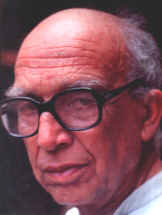 Makhan Lal Kaul Mahav Makhan Lal Kaul Mahav
Noted poet and Journalist, started as a
teacher but turned to journalism afterwards. Through the literary
columns of the newspaper KHIDMAT he gave many budding writers
opportunities to express themselves.
>>>
|
|
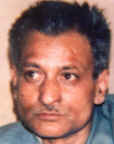 Kashi Nath Revoo Shehjaar Kashi Nath Revoo Shehjaar
A Sanskrit scholar whose command on the language could be outshined
only by him preferred to maintain a low profile throughout his life.
Translating English poetry into Sanskrit was his favorite past time. He
wrote devotional songs in Kashmiri and Hindi.
>>>
|
|
|
|
 Prem Nath Premi Prem Nath Premi
Pt. Prem Nath Premi, a well known writer of Kashmir, was born in Srinagar on 29th
September, 1929 to a family of humble means. He had a strong urge to
study which enabled him to obtain Master's degree in several subjects.
>>> |
|
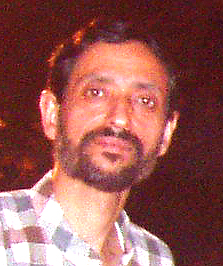 Subhash Premi Subhash Premi
Subhash ji writes poems in Hindi. He is known for his artistic
skills of playing Kongo.
>>>
|
|
|
|
|
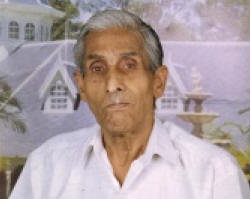 Mohan Lal Razdan Mohan Lal Razdan
Sh.
Mohan Lal Razdan was experienced personality and has authored many
Kashmiri poems/bhajans/ghazals. His poems are mainly based on mysticism
and belief that the world is mortal. He has followed the path of his
Guru Late Swami Madsudhan Razdan. >>> |
|
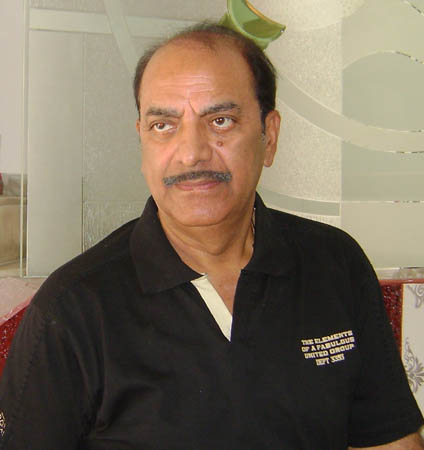 Dr.
Roshan Saraf Dr.
Roshan Saraf
A Medical Doctor by profession. Writer & Poet in Kashmiri, Urdu, Hindi, English; Singer,
Musician & Anchor by passion.
>>> |
|
|
|
|
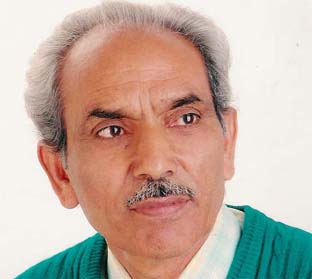 Prem
Nath Shad Prem
Nath Shad
Prem Nath Shad writes ghazals, nazms,
vatsuns, bhajans, marsias, naat, poems for
children, essays and translations. He is an approved poet by All India Radio
(Radio Kashmir) and Doordarshan. >>> |
|
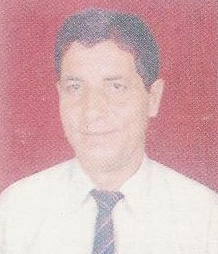 Jawahir
Lal Raina 'Saroor' Jawahir
Lal Raina 'Saroor'
Sh. Saroor writes ghazals, nazms, vatsuns,
bhajans, rubayaat, fictions, marsias,
poems for children, and essays. He is an
approved poet by All India Radio (Radio
Kashmir/Jammu) and Doordarshan.
>>>
|
|
|
|
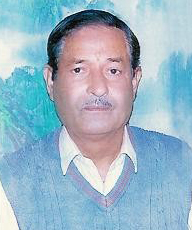 Som Nath Bhat 'Veer' Som Nath Bhat 'Veer' |
|
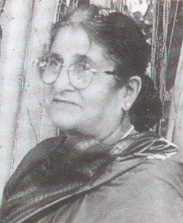 Sarojini
Kak Sarojini
Kak |
|
|
|
 Arnimal
- A Leading Light
Arnimal
- A Leading Light
Born
in the eighteenth century, nearly two hundred years after
Habba Khatoon, Arnimal followed in the wake of the tradition
of her predecessor and made the love lyrics adopted by Habba
Khatoon more of a plaintive wail. Arnimal's lyrics are
masterpieces of Kashmiri language.
>>>
|
|
 Abdul
Ahad "Azad" - The Poet of Tomorrow
Abdul
Ahad "Azad" - The Poet of Tomorrow
'Azad'
is inherently possessed of uncommon consciousness of head
and heart. He has never elected to go into the shell like
other Kashmiri Romanticists. Instead, he has tried to
analyse Man in every sense of the word, bereft of any curves
or blind alleys.
>>>
|
|
|
|
 Ksemendra
- The Peoples' Poet
Ksemendra
- The Peoples' Poet
Ksemendra
did not err in his duty towards his brethren and though being
a rebel did initiate a very healthy trend in the sanskrit
literary tradition. He made heroes and heroines of ordinary
mortals in flesh and blood - the courtesan, the clerk, the
miser and many others culled from ordinary life.
>>>
|
|
 Chakbast
Chakbast
He
started writing poetry from a very young age and generally
his poetic compositions used to be very short, crisp and
meaningful. He always used a very simple language in his
Urdu compositions and used to describe the complexities of
life in the shortest possible sentence in plain words.
>>>
|
|
|
|
 Shamas
Faqir - Religious Mysticism
Shamas
Faqir - Religious Mysticism
With
the advent of Islam in India, Persian studies gained
popularity among the literary sections of the society,
that included the Hindus and the Muslims alike. This led
to an interchange of concepts from Vedanta and Sufism
between the two communities.
>>>
|
|
 Saint-Poet
Mirza Kak
Saint-Poet
Mirza Kak
After
Lal Ded, Sahzanand and Roopa Bhawani, the Valley was again
blessed with the birth of one more saint- poet Mirza Kak,
who contined the Vakh parampara in Kashmir. Vakhs are the
quintessence of spiritual and religious sayings and
utterances of mystics and saints.
>>>
|
|
|
|
 Mahmud
Gami
Mahmud
Gami
Mahmud
Gami (1765-1855) introduced in Kashmiri the Persian forms
of the masnavi and ghazal. He is noted for his work Yusuf
Zulaikha, a poem which is a major contribution to Kashmiri
literature.
>>>
|
|
 Avatar
Bhatt
Avatar
Bhatt
Avatar
Bhatt (15th century) was a court-poet to King
Zain-ul-Abidin and a noted scholar of Sanskrit and
Persian. He is known for his work Banasur Katha (The Story
of the Demon Banasur).
>>>
|
|
|
|
 Rasool
Mir
Rasool
Mir
Love,
is the waft and whoop, the craft and creed of Rasul
Mir (He lived love, sang love, and lives for his love-ful
passion). Love, the first strings of human heart that
present the whole universe as an undulating poem.
>>>
|
|
 Samad
Mir
Samad
Mir
Samad
Mir (1894-1959), known for his outstanding work
Akanandun (The Only Son), continued the Sufi-mystic
tradition in Kashmiri poetry in the 20th century. Samad
Mir has used the folk tale of Akanandun to give
expression to his own mystical ideas and present a
synthesis between Tassavuf (sufism) and Trika (Shaivism).
>>>
|
| |
|
|
 Maqbool
Shah Kralawari
Maqbool
Shah Kralawari
Maqbool
Shah Kralawari (1820-'76) was educated in Persian
literature and is considered as the finest lyricist of the
19th century Kashmir. In his Malanama, he lacerated the
'mullahs' for being hand in glove with the ruthless
landlords but masquerading as the defenders of virtue and
the redeemers of the poor.
>>>
|
|
|
|
Articles |
 Mystic
Trends in Kashmiri Poetry
Mystic
Trends in Kashmiri Poetry
Ours is a great
country. We have had for centuries a great history, the whole of the East
reflects our culture. We have to present what India taught right from the
Mohenjo-Darro and Harappa times. These are the precious words of Dr S.
Radhakrishnan. Kashmir is the most important part of this great country
with a rich geographical, historical, cultural and literary background. It
is known as a famous seat of learning. Kalhana has given us the first
chronological order of the kings of Kashmir and thus Rajtarangini is the
first history of Kashmir written in the 12th Century.
>>>
|
|
 Four
Famous Poetesses of Kashmir
Four
Famous Poetesses of Kashmir
Kashmir, which is known
as the 'paradise on earth', has been the abode of eminent scholars,
savants, historians and poets, like Bilhan, Mamatachary, Anandavardhana,
Gunaverman, Abhinavagupta, Jonaraja, Kalhana, etc. These luminaries had
mastery over Sanskrit language. During the Muslim rule, Persian became the
court language. Kashmiri scholars did not lag behind in acquiring mastery
in this language also and produced scholars and poets like Gani Kashmiri,
Munshi Bhawani Dass Kachroo, Hyder Malik Chadura, Narayan Kaul Ajiz,
Muhammad Azam Didmari, etc.
>>>
|
|
|
|
 Contribution
to Poetics and Dramaturgy
Contribution
to Poetics and Dramaturgy
External Site
|
|
 Ksemendra
- A People's Poet
Ksemendra
- A People's Poet
External Site
|
|
|
|
 Poetry
of Shaik-Ul-Alam
Poetry
of Shaik-Ul-Alam
External Site
|
|
 Chakbast:
The Poet of Patriotism
Chakbast:
The Poet of Patriotism
External Site
|
|
|
|
Articles taken from:
Patrika
Bhagwaan Gopinath ji Ashram
Glimpses
of Kashmir
Shri Parmanand Research Institute
Srinagar, Kashmir
Vitasta
Kashmir Sabha, Calcutta
Koshur
Samachar
Kashmir Bhawan
Amar Colony, Lajpat Nagar
New Delhi - 110 024
|
